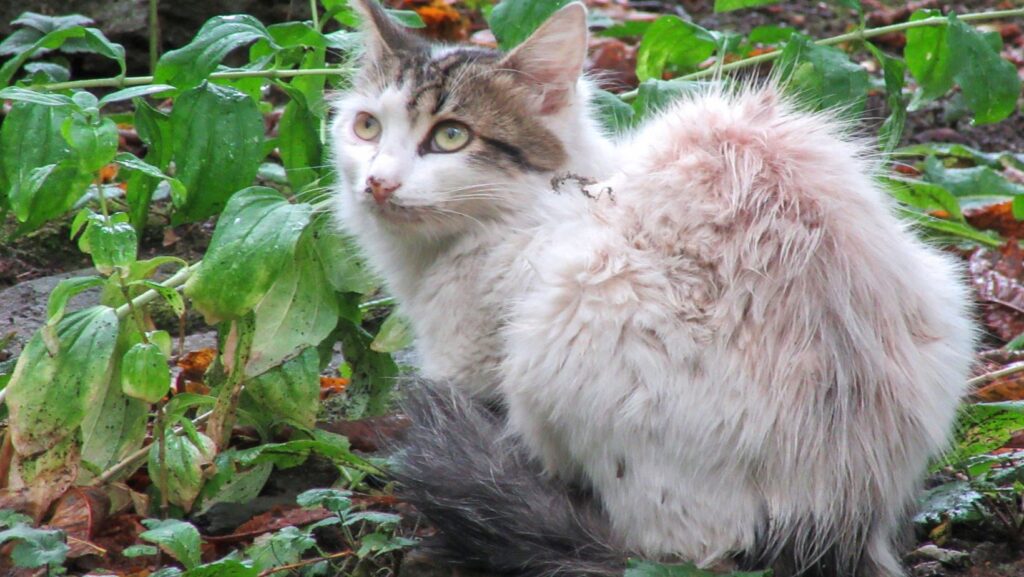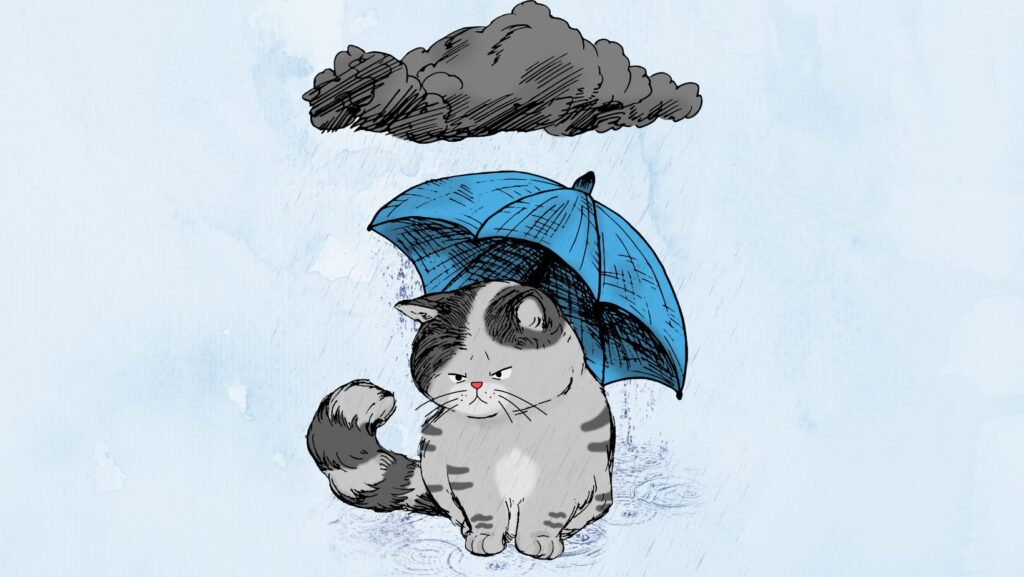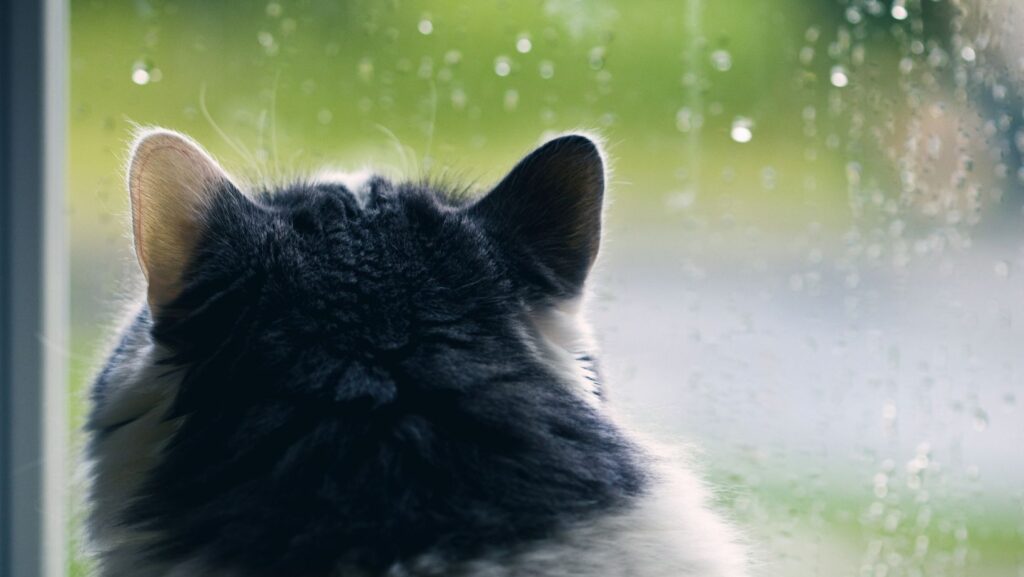If your cat is trembling and shivering in the rain, it could be due to several reasons. Here are some possible explanations for your cat’s behavior:
- Temperature and Discomfort: Cats can be sensitive to cold temperatures, and being wet in the rain can make them feel chilled. Trembling and shivering are natural responses to generate body heat and try to maintain a comfortable temperature. Providing your cat with a warm and dry place to shelter can help alleviate their discomfort.
- Fear or Anxiety: Some cats may experience fear or anxiety during rainstorms. The sound of raindrops, thunder, or other environmental changes associated with rain can trigger a stress response in cats. Trembling and shivering may be signs of their anxiety or unease. Creating a calm and secure environment for your cat to retreat to can help alleviate their fear.
- Negative Past Experiences: If your cat has had a traumatic experience related to rainy weather in the past, it may associate rain with fear or discomfort. This association can lead to trembling and shivering as a response to the rain.
- Sensory Overload: Cats have sensitive senses, and the sensory experience during a rainstorm, including the sound, smell, and feel of raindrops, can be overwhelming for some cats. Trembling and shivering may be a result of their heightened sensory perception.
- Physical Illness or Pain: It’s possible that your cat’s trembling and shivering in the rain could be related to an underlying health issue or pain. If the behavior persists or is accompanied by other concerning symptoms, it is advisable to consult with a veterinarian for a thorough examination.
Observing your cat’s overall behavior and well-being can help you determine the cause of their trembling and shivering in the rain. Providing a safe and comfortable environment, ensuring they have access to shelter, and monitoring their behavior for any changes are important steps to help your cat feel more at ease during rainy weather. If you have concerns or if the behavior persists, consulting with a veterinarian is recommended for proper evaluation and guidance.

Post Contents
Why Is My Cat Anxious and behaves weird When It Rains?
Cats can exhibit anxiety or stress during rainy weather for various reasons. Here’s some insight into why cats may become anxious when it rains:
- Noise Sensitivity: Rainfall can produce loud sounds, particularly when hitting surfaces like roofs or windows. Some cats are sensitive to sudden or loud noises, and the sound of raindrops can startle or unsettle them, leading to anxiety.
- Environmental Changes: Rain brings changes in the environment, such as wet surfaces, altered scents, and different sights. Cats are creatures of habit and thrive on routine and familiarity. When their surroundings change due to rain, it can trigger stress or anxiety.
- Negative Associations: Cats may associate rain with negative experiences. For example, if they’ve been caught in rain before and felt uncomfortable or if they’ve experienced trauma during storms, they may develop fear or anxiety related to rainy weather.
- Discomfort: Some cats dislike being wet. Rain can make their fur damp, leading to discomfort and potentially causing them to feel anxious or unsettled.
- Limited Outdoor Activities: Cats that are primarily outdoor pets may experience frustration or restlessness when unable to roam freely due to rain. Being cooped up indoors can contribute to their anxiety or unease.
- Sensory Changes: Rain can alter scents and affect a cat’s ability to perceive their environment. Cats rely heavily on their sense of smell, and when scents are masked or changed by rain, it can lead to confusion or stress.
- Individual Personality: Every cat has a unique personality and tolerance for different stimuli. Some cats may simply be more prone to anxiety, while others may remain unaffected by rainy weather.
Why Is My Cat Sitting Out In The Rain?
Regarding cats sitting out in the rain or being scared of heavy rain, individual cats may have varying preferences and reactions. Some cats may enjoy the sensation of rain or find comfort in sitting outdoors during light rain. However, it’s essential to provide them with shelter options so they can retreat to a dry and secure space if they become uncomfortable. Heavy rain, with its intensified sounds and potential for stronger winds, can be more unsettling for cats, causing them to seek shelter and exhibit signs of fear or anxiety.
It’s important to observe your cat’s behavior and body language during rainy weather. If your cat displays significant anxiety or distress, providing a calm indoor environment, access to safe shelters, and engaging in soothing activities can help alleviate their stress. Consulting with a veterinarian or a certified animal behaviorist can provide additional guidance and support for managing your cat’s anxiety during rainy conditions.
If your cat is choosing to sit out in the rain, it could be due to individual preferences or behaviors. Some cats may enjoy the sensation of rain on their fur or find it intriguing to observe the environment during rainfall. However, it’s important to ensure your cat has access to shelter and a dry area where they can retreat if they become uncomfortable or need protection from heavy rain.

What Should I Do If My Cat Is Shaking?
If your cat is shaking, it can be a cause for concern. Shaking in cats can indicate various underlying issues, and it’s important to assess the situation and consider the following steps:
- Observe Your Cat: Take note of the circumstances surrounding the shaking episode. Is it happening consistently or intermittently? Are there any other accompanying symptoms, such as vomiting, lethargy, or changes in appetite? This information will be helpful when consulting with a veterinarian.
- Ensure Safety: If your cat is shaking, make sure they are in a safe environment where they cannot injure themselves. Remove any potential hazards and provide a calm and quiet space for them to rest.
- Check Body Temperature: Cold temperatures can cause cats to shake. If your cat has been exposed to cold weather, provide them with a warm and cozy area to help regulate their body temperature. Use blankets or a heating pad set on low (with caution and supervision) to provide warmth.
- Examine for Injuries: Inspect your cat for any visible signs of injuries or discomfort. Check their limbs, joints, and paws carefully. If you notice any swelling, wounds, or signs of pain, contact your veterinarian for further evaluation.
- Monitor Behavior and Appetite: Keep an eye on your cat’s behavior, appetite, and litter box usage. Changes in behavior or appetite, along with shaking, can indicate an underlying medical condition. If your cat is showing additional concerning symptoms, it’s crucial to seek veterinary attention.
- Consult a Veterinarian: If your cat’s shaking persists, worsens, or is accompanied by other symptoms, it’s best to schedule a veterinary appointment. A veterinarian can conduct a thorough examination, perform diagnostic tests if necessary, and provide a proper diagnosis and appropriate treatment plan.
Remember, cats are experts at hiding discomfort or pain, so it’s important to be vigilant and seek veterinary advice if you have any concerns about your cat’s health. Early intervention can help address potential issues and improve the overall well-being of your cat.

Why Are Cats Afraid Of Thunderstorms?
Cats can be afraid of thunderstorms due to several reasons:
- Loud Noises: Thunderstorms are accompanied by loud thunderclaps that can startle cats. Cats have sensitive hearing, and the sudden, booming sounds can trigger fear or anxiety.
- Atmospheric Changes: Cats may be sensitive to changes in atmospheric pressure that occur during storms. These changes can cause discomfort or unease in some cats.
- Electrical Charges: Thunderstorms generate static electricity in the air, which cats may be able to sense. This can contribute to their anxiety or fear during storms.
- Negative Association: If a cat has had a previous negative experience during a thunderstorm, such as being caught outside in heavy rain or experiencing a traumatic event, they may develop a fear or phobia associated with thunderstorms.
Strategies to calm a cat in a storm
- Create a Safe Space: Set up a safe and comfortable area where your cat can seek refuge during the storm. This can be a quiet room with familiar items, such as their bed, toys, and scratching post. Ensure the space is away from windows to minimize exposure to the storm.
- Provide Background Noise: Play soothing music or use white noise machines to help mask the sounds of thunder and create a more calming environment for your cat.
- Stay Calm and Reassuring: Cats can pick up on their owners’ emotions, so it’s important to remain calm and composed. Speak softly and provide gentle reassurance to let your cat know they are safe.
- Distraction with Toys and Play: Engage your cat in interactive play or offer their favorite toys to redirect their attention away from the storm. This can help them focus on positive experiences and alleviate anxiety.
- Use Calming Products: Consider using calming pheromone diffusers or sprays specifically designed for cats. These products can help create a sense of security and relaxation.
- Consult a Veterinarian: If your cat’s fear of thunderstorms is severe or causing significant distress, consult with a veterinarian. They may recommend behavioral modification techniques or prescribe anti-anxiety medications if necessary.
It’s important to note that each cat is unique, and what works for one may not work for another. Observing your cat’s behavior and body language will help you determine the most effective strategies for calming them during a storm. Patience, understanding, and providing a secure environment are key to helping your cat feel more at ease.
Cat and Rain Fear
- Do Cats Get Affected By Rain? Yes, cats can be affected by rain. Rainy weather introduces changes in their environment, such as wet surfaces, altered scents, and different sounds. Some cats may find these changes unsettling or uncomfortable, while others may not be significantly affected.
- Do Cats Get Stressed When Raining? Some cats may experience stress or anxiety during rainstorms. The sound of raindrops, thunder, and the overall changes in their surroundings can trigger stress responses in sensitive cats. However, not all cats will experience stress during rainy weather, as individual personalities and experiences can influence their reactions.
- How Does Rain Affect Cats? Rain can affect cats in various ways. It may cause discomfort if their fur becomes wet, leading to a cold or unpleasant sensation. Additionally, the noise of raindrops hitting surfaces can startle or unsettle some cats. Changes in scents and the overall environment can also impact a cat’s perception and behavior.
- How Do Cats Behave In Rainy Season? Cats’ behavior during the rainy season can vary. Some cats may prefer to seek shelter indoors, staying in dry and cozy areas until the rain subsides. Others may be less bothered by rain and may continue their usual activities, with or without venturing outside. Each cat has its own unique preferences and reactions to rainy weather.
- Are Cats Scared Of Heavy Rain? Cats can be scared of heavy rain, particularly if it is accompanied by loud thunder or strong winds. The intensified sounds and potentially more intense environmental conditions may trigger fear or anxiety in some cats. They may seek shelter and exhibit signs of stress or unease during heavy rain.
Thunderstorm and Rain Phobias in Cats
Thunderstorm and rain phobias in cats refer to an intense fear or anxiety response exhibited by some cats during thunderstorms or rainy weather. These phobias can significantly impact a cat’s well-being and may require intervention and management strategies. Here’s some information about thunderstorm and rain phobias in cats:
Causes and Triggers:
- Loud Noises: Cats have sensitive hearing, and the loud thunderclaps associated with thunderstorms can startle and frighten them.
- Atmospheric Changes: Cats may be sensitive to changes in atmospheric pressure or electrical charges in the air that occur during storms.
- Negative Association: Cats can develop a fear or phobia of thunderstorms or rain if they have had traumatic experiences during such weather conditions in the past.
- Sensory Sensitivity: Cats’ heightened senses can make them more susceptible to the overwhelming sounds, vibrations, and other sensory stimuli associated with storms.
Signs of Thunderstorm and Rain Phobia:
Cats with thunderstorm and rain phobias may exhibit various signs of fear or anxiety, including:
- Hiding or seeking shelter in enclosed spaces
- Pacing or restlessness
- Vocalization (excessive meowing or growling)
- Trembling or shaking
- Excessive grooming or licking
- Urinating or defecating outside the litter box
- Destructive behavior
- Loss of appetite
Managing Thunderstorm and Rain Phobias:
- Create a Safe Space: Provide your cat with a designated safe area indoors where they can seek refuge during storms. This area should be quiet, cozy, and contain familiar items like bedding and toys.
- Noise Reduction: Minimize the sound of thunder by closing windows and using white noise machines, fans, or calming music to mask the noise.
- Distraction and Play: Engage your cat in interactive play or provide puzzle toys to redirect their attention away from the storm.
- Provide Hiding Options: Allow your cat access to hiding places, such as cardboard boxes or covered cat beds, where they can feel secure during storms.
- Calming Techniques: Try gentle massage or use calming pheromone products specifically designed for cats to help reduce anxiety.
- Behavior Modification: Consider desensitization and counterconditioning techniques, gradually exposing your cat to recorded storm sounds at a low volume while providing positive reinforcement and rewards.
- Consult a Veterinarian: If your cat’s phobia is severe or significantly affects their quality of life, consult with a veterinarian or a certified animal behaviorist. They can provide guidance, behavior modification plans, or prescribe anti-anxiety medications if necessary.
It’s important to approach the management of thunderstorm and rain phobias in cats with patience and empathy. Each cat is unique, and finding the most effective strategies may require trial and error. Providing a secure environment and seeking professional advice when needed can help improve your cat’s comfort and well-being during stormy weather.
Summary
It’s important to monitor your cat’s behavior and provide suitable options for shelter and comfort during rainy weather. If you notice significant stress or anxiety in your cat, consult with a veterinarian or a certified animal behaviorist for guidance on managing their specific needs and helping them feel more at ease during rainy conditions.
![Cat Trembling And Shivering In Rain and Storm: [6 Reasons and Tips]](http://www.inpetcare.com/wp-content/uploads/2023/02/taniya-1.jpg)
94% of pet owners say their animal pal makes them smile more than once a day. In 2007, I realized that I was made for saving Animals. My father is a Vet, and I think every pet deserves one. I started this blog, “InPetCare”, in 2019 with my father to enlighten a wider audience.
![Cat Trembling And Shivering In Rain and Storm: [6 Reasons and Tips]](https://www.inpetcare.com/wp-content/uploads/2023/05/Why-Is-My-Cat-Trembling-And-Shivering-In-Rain-and-Storm.jpg)